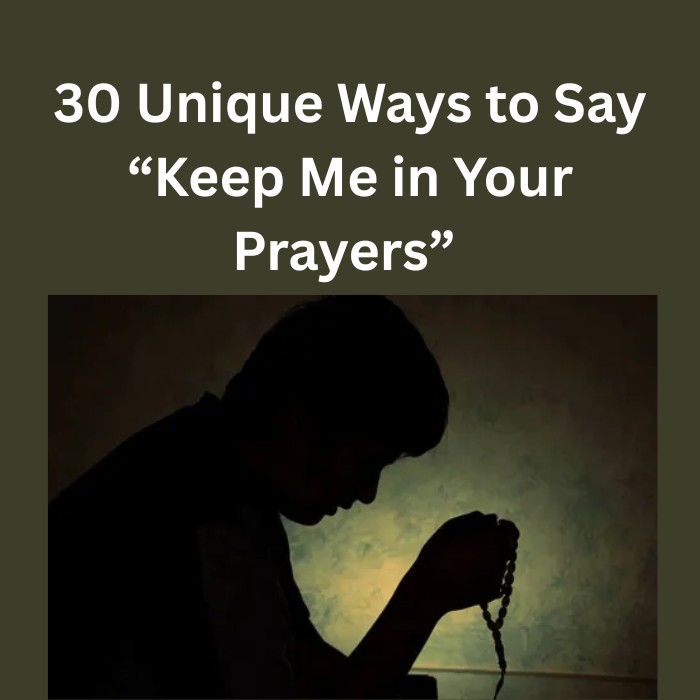30+ Unique Ways to Say “Keep Me in Your Prayers”

Expressing a need for spiritual support can sometimes feel challenging, but there are countless creative ways to ask others to lift you up in their thoughts.
From inspirational keep me in your prayers quotes to simple yet sincere pleas like please keep me in your prayers, you will find a range of expressions that suit any situation.
This article presents 30 unique ways to say “keep us in your prayers,” introducing various keep me in your prayers synonyms that can add depth to your requests.
A Gentle Request for Support
- When to use: During personal struggles or when you’re seeking emotional comfort.
- When not to use: In casual conversations where the tone is light or playful.
Example: “I’m in need of some extra love and support right now, and I’d be grateful if you could keep me in your prayers.”
Asking for Prayers and Clarity
- When to use: When you’re facing an important or uncertain decision and need guidance.
- When not to use: For minor choices that don’t carry emotional or spiritual weight.
Example: “I’m facing a difficult decision right now, and I would appreciate your prayers for guidance and clarity.”
A Prayer for Peace Within
- When to use: When you’re feeling stressed, anxious, or emotionally unsettled.
- When not to use: When you’re already in a peaceful or content state of mind.
Example: “I’m feeling overwhelmed right now and could use some extra prayers to help me find peace and calm.”
“I’d appreciate your positive thoughts and prayers.”
- This expression merges gratitude with a request, making it clear that their support has a tangible impact.
- When to use: When you want to acknowledge the power of positivity alongside prayer.
- When not to use: If the person you’re speaking with is skeptical about prayer or spirituality.
Example: “As I undergo this treatment, I’d appreciate your positive thoughts and prayers.”
“Please remember me in your prayers.”
- A gentle reminder that your needs are present in someone’s thoughts, this phrase is respectful and heartfelt. It fosters a sense of community and shared concern.
- When to use: In group settings or among friends who share similar beliefs.
- When not to use: With those who might not be familiar with the tradition of prayer.
Example: “As I navigate this difficult time, please remember me in your prayers.”
“I’m in need of your prayers right now.”
- This direct approach highlights urgency and sincerity, making it clear that you’re reaching out for help.
- When to use: When facing immediate challenges that require support from loved ones.
- When not to use: If the context is light-hearted or casual.
Example: “I’m in need of your prayers right now as I deal with some family issues.”
“Your prayers are appreciated during this tough time.”
- Acknowledging the support you receive can strengthen bonds, showing that you value the other person’s involvement.
- When to use: After someone has already expressed willingness to pray for you.
- When not to use: When seeking help from someone who might not be inclined toward spirituality.
Example: “Thank you for checking in; your prayers are appreciated during this tough time.”
“Could you keep me in your thoughts and prayers?”
- This invitation balances the act of thinking positively with prayer, appealing to both spiritual and secular audiences.
- When to use: When addressing a diverse group or individuals with varying beliefs.
- When not to use: In environments where prayer is not typically discussed.
Example: “As I prepare for my surgery, could you keep me in your thoughts and prayers?”
“I’m asking for your prayers as I face this challenge.”
- This statement shows humility and a willingness to lean on others, reinforcing the idea that asking for help is a strength, not a weakness.
- When to use: In moments of personal crisis where support is essential.
- When not to use: If you’re uncomfortable sharing details about your situation.
Example: “I’m asking for your prayers as I face this challenge with my health.”
“I’d be grateful for your prayers and positive vibes.”
40+ Good Morning Messages for Him that Touches the Heart
- Combining prayer with good energy makes this phrase feel contemporary and relatable, appealing to a broader audience while still holding onto tradition.
- When to use: Among friends or peers who value both spiritual and emotional support.
- When not to use: In formal or traditional settings where prayer is more serious.
Example: “I’d be grateful for your prayers and positive vibes as I move forward with my plans.”
“Please include me in your prayers.”
- This straightforward request leaves little room for misinterpretation, emphasizing the importance of collective support in difficult times.
- When to use: When reaching out to close friends or family who understand your needs deeply.
- When not to use: In unfamiliar social circles where such requests may seem out of place.
Example: “As I prepare for this major life change, please include me in your prayers.”
“I could use your prayers during this tough period.”
- This phrase acknowledges both the difficulty of your situation and the necessity of support, fostering genuine concern from those around you.
- When to use: When you’re open about your struggles and seeking comfort from trusted individuals.
- When not to use: If you prefer to handle challenges independently without external input.
Example: “With everything going on, I could really use your prayers during this tough period.”
“Send up a prayer for me if you can.”
- Sharing your struggles can be daunting, but asking for prayers can be a source of strength. This phrase invites others to support you spiritually without sounding demanding.
- When to use: Use this when you want to gently ask for prayer support from friends or family during challenging times.
- When not to use: Avoid it in formal settings where spiritual discussions may not be appropriate.
Example: “I’m going through a tough time at work; send up a prayer for me if you can.”
“I’d love your prayers as I navigate this situation.”
- This approach expresses vulnerability while emphasizing the importance of community support. It highlights your desire for guidance and positive energy.
- When to use: Use this when facing a significant decision or challenge that requires emotional backing.
- When not to use: Refrain from using it in casual contexts where the gravity of the situation might be lost.
Example: “As I make this career change, I’d love your prayers as I navigate this situation.”
“Your prayers would be a great comfort to me.”
- This phrase underscores the emotional relief that comes from knowing others are thinking of you. It creates an intimate connection, fostering a sense of belonging.
- When to use: Use this when you feel overwhelmed and need reassurance from your support network.
- When not to use: Avoid it with acquaintances or in situations where the bond is not strong enough.
Example: “Facing health issues has been hard; your prayers would be a great comfort to me.”
“I’d be grateful if you could keep me in your prayers.”
- A straightforward yet heartfelt request, this phrase conveys gratitude while seeking spiritual support. It acknowledges the effort involved in praying for someone else.
- When to use: Use this when reaching out to friends or family who are likely to respond positively.
- When not to use: Do not use it in impersonal communications, such as mass emails or social media posts.
Example: “As I deal with personal challenges, I’d be grateful if you could keep me in your prayers.”
“I’m reaching out for your prayers during this time.”
- This phrase is an earnest appeal for support, emphasizing the urgency of your situation. It signals that you are comfortable sharing your struggles with those close to you.
- When to use: Use this when you feel vulnerable and need immediate emotional or spiritual assistance.
- When not to use: Avoid it if you believe the recipient may not take your request seriously.
Example: “I’m reaching out for your prayers during this time of uncertainty in my life.”
“Your prayers would mean a lot to me right now.”
- This phrase communicates the value of the other person’s support, making them feel needed and appreciated. It fosters a sense of community and mutual care.
- When to use: Use this when your situation feels particularly heavy and you want to express how much their support matters.
- When not to use: Avoid using it in casual conversations where the sentiment might seem exaggerated.
Example: “As I face these challenges, your prayers would mean a lot to me right now.”
“I’m counting on your prayers as I go through this.”
- This phrase conveys trust in the recipient’s ability to uplift you spiritually, reinforcing your bond. It emphasizes the reliance on collective strength during tough times.
- When to use: Use this when you’re navigating significant life events and need solid support from trusted individuals.
- When not to use: Avoid using it with people you don’t know well or who may not share your beliefs.
Example: “As I prepare for surgery, I’m counting on your prayers as I go through this.”
“Please hold me in your prayers.”
- This simple yet powerful request conveys sincerity and humility, appealing directly to the listener’s goodwill. It invites them into your personal journey.
- When to use: Use this when seeking heartfelt support from close friends or family during difficult times.
- When not to use: Avoid it in professional or formal contexts where personal matters should remain private.
Example: “As I deal with loss, please hold me in your prayers.”
“I’d appreciate your prayers as I work through this.”
- This phrase expresses gratitude while highlighting the active process of overcoming challenges. It encourages ongoing spiritual support as you navigate difficulties.
- When to use: Use this when tackling a complex situation that requires time and perseverance.
- When not to use: Avoid using it in superficial exchanges where the depth of meaning might be overlooked.
Example: “I’m facing some tough choices; I’d appreciate your prayers as I work through this.”
“Could you send a prayer my way?”
- When facing personal struggles, reaching out for support can feel daunting. Asking someone to send a prayer your way opens the door for compassion and understanding.
- When to use: This phrase is ideal when you’re comfortable with the person and know they share your beliefs.
- When not to use: Avoid this when the person may not have a spiritual practice or if you’re in a professional setting where religious expressions might not be appropriate.
Example: “I’m going through a tough time with my health; could you send a prayer my way?”
“I’d be thankful for your prayers during this challenging time.”
- Expressing gratitude while seeking prayers emphasizes the importance of community support during difficult moments. It also invites others to join you in your journey with positivity.
- When to use: This phrase is effective in both personal and social contexts, especially among friends and family who understand your situation.
- When not to use: It may not resonate well in strictly secular environments or when addressing someone you don’t know well.
Example: “As I deal with this job transition, I’d be thankful for your prayers during this challenging time.”
“Your prayers are needed and appreciated.”
- This straightforward appeal communicates urgency while recognizing the value of the other person’s spiritual contributions. It fosters a sense of shared responsibility in your journey.
- When to use: Use it when you feel overwhelmed and need immediate support from those close to you.
- When not to use: Steer clear of this phrase if you’re unsure about the recipient’s beliefs or if the context is too formal.
Example: “I’m facing some tough decisions right now; your prayers are needed and appreciated.”
“Please lift me up in your prayers.”
- This request is a gentle nudge towards collective support, evoking imagery of elevation and encouragement. It invites others to actively participate in your healing process.
- When to use: Perfect for intimate conversations with friends or family who are aware of your situation.
- When not to use: Avoid it when speaking to acquaintances or in settings where religious language might be misunderstood.
Example: “I’m struggling with some personal issues; please lift me up in your prayers.”
“I’m in need of your spiritual support right now.”
- This direct statement highlights the importance of spiritual backing, making it clear that you value their faith as a source of strength. It creates a space for vulnerability.
- When to use: Use this when you want to convey the seriousness of your situation to someone you trust.
- When not to use: It may be inappropriate in casual settings or with individuals who do not identify as spiritual.
Example: “During this difficult transition, I’m in need of your spiritual support right now.”
“I’d love to have your prayers as I face this challenge.”
- This heartfelt request invites others into your struggle, emphasizing hope and community. It’s an open invitation for connection and shared intention.
- When to use: Ideal for close friends or family members who are emotionally invested in your well-being.
- When not to use: Avoid using it when the relationship is more formal or business-oriented.
Example: “As I prepare for my surgery next week, I’d love to have your prayers as I face this challenge.”
“Your prayers would be a great help to me now.”
- This expression acknowledges the power of prayer as a form of assistance, making others feel valued for their potential contributions. It reinforces the bond between you and the listener.
- When to use: Use it when you’re reaching out during a particularly tough phase in life.
- When not to use: Avoid using it in casual or lighthearted discussions where the gravity of your situation might not be understood.
Example: “With everything happening right now, your prayers would be a great help to me now.”
“I’d be grateful if you could keep me in your thoughts and prayers.”
- This polite request combines gratitude with an invitation for mindfulness, suggesting that their thoughts alone are meaningful. It’s a gentle way to ask for support without being demanding.
- When to use: Best used among friends who appreciate a thoughtful approach to spiritual support.
- When not to use: Not suitable for formal settings where personal beliefs may vary widely.
Example: “I’m really struggling with anxiety lately; I’d be grateful if you could keep me in your thoughts and prayers.”
15+ TFTI Meaning & Alternatives: How to Respond and Use It Correctly
“I’m seeking your prayers as I work through this issue.”
- In a moment of vulnerability, you confide in a close friend about the challenges you’re facing at work.
- When to use: This phrase is ideal when you’re dealing with personal struggles or challenges that require emotional support.
- When not to use: Avoid this phrase in casual conversations or with acquaintances who may not understand the depth of your situation.
Example: “I’m seeking your prayers as I work through this issue with my family; it means a lot to have your support during tough times.”
“Please keep me in your prayers as I navigate this.”
- As you face a significant life transition, like moving to a new city or starting a new job, you reach out to friends and family for their thoughts and prayers.
- When to use: Use this phrase during times of change or uncertainty, such as embarking on a new project or facing major life decisions.
- When not to use: Steer clear of this phrase in professional settings where personal matters might be deemed inappropriate.
Example: “Please keep me in your prayers as I navigate this new job opportunity; I truly value your encouragement.”
“I’d appreciate your prayers and positive energy.”
- After sharing news about a health challenge, you turn to your community for support, asking them to send you their thoughts and positive vibes.
- When to use: This phrase works well when you’re looking for both spiritual support and emotional encouragement.
- When not to use: Avoid using this expression if you’re discussing something very serious or sensitive in nature where people may feel uncomfortable offering only “positive energy.”
Example: “I’d appreciate your prayers and positive energy as I prepare for my upcoming surgery; knowing you’re with me makes a world of difference.”
Conclusion
Expressing the sentiment of keep me in your prayers can take many forms, each resonating with personal meaning and intention. Whether you choose to use a keep me in your prayers synonym or share heartfelt keep me in your prayers quotes, the essence remains the same: a request for support and compassion during challenging times.
By saying, “please keep me in your prayers,” or asking others to “keep us in your prayers,” you foster a sense of community and shared hope. These phrases not only strengthen connections but also remind us of the power of collective prayer.






